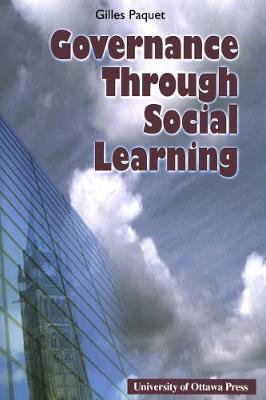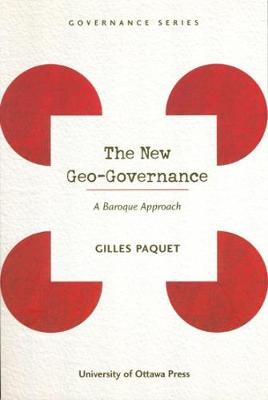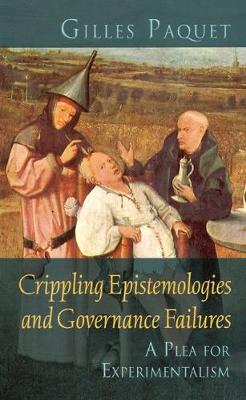Governance
6 total works
Governance connotes the way an organization, an economy, or a social system co-ordinates and steers itself. Some insist that governing is strictly a top-down process guided by authority and coercion, while others emphasize that it emerges bottom-up through the workings of the free market. This book rejects these simplistic views in favour of a more distributed view of governance based on a mix of coercion, quid pro quo market exchange and reciprocity, on a division of labour among the private, public, and civic sectors, and on the co-evolution of these different integration mechanisms. This book is for both practitioners confronted with governance issues and for citizens trying to make sense of the world around them.
Political commentator and public policy analyst Gilles Paquet examines the benefits and drawbacks of Canada's multiculturalism policy. He rejects the current policy which perpetuates difference and articulates a model for Canadian transculturalism, a more fluid understanding of multiculturalism based on the philosophy of cosmopolitanism which would strengthen moral contracts and encourage the social engagement of all Canadians.
Gomery's Blinders and Canadian Federalism
by Ruth Hubbard and Gilles Paquet
Published 1 January 2007
In 2004, Paul Martin asked Justice John Gomery to lead a public inquiry into potential misspending in the federal Sponsorship Program, a relatively small investment of taxpayers' money to try to convince Quebeckers of the benefits of Canadian federalism in the aftermath of the 1995 referendum on Quebec separation. The Gomery inquiry chose to focus exclusively on the sordid details of the money laundering and paid no attention to the deeper causes and sources of the problem: the dysfunctions of an existing centralized governing apparatus that is tearing the fabric of the country apart and the collusion of centralizing groups defending the status quo.
Over the last few decades, the Westphalian nation-state has lost its hegemonic position in the system of geo-governance. A dispersive revolution has led to the emergence of powerful newly networked business organizations, new subsidiary-focused governments, and increasingly virtual, elective, and malleable communities. This in turn has led to the crystallization of distributed governance regimes, based on a wider variety of more fluid and always evolving groups of stakeholders. In "The New Geo-Governance", Gilles Paquet develops a general conceptual framework to deal with the new evolving reality of global governance. He uses this framework to critically examine the evolving territorial governance (hemispheric governance, meso-innovation systems, and smart city-regions) and tackles the more complex governance challenges raised by sustainability and common-property resources like oceans.
Paquet further explores the implications of this emerging polycentric geo-governance on the new forms of stewardship and its impact on citizenship, federalism, and other technologies of coordination, and reflects on the sort of subversive bricolage required if the missing mechanisms for effective coordination are to be put in place. "The New Geo-Governance" will be of great interest to students and scholars interested in governance, organizational design, international affairs, and political studies.
Paquet further explores the implications of this emerging polycentric geo-governance on the new forms of stewardship and its impact on citizenship, federalism, and other technologies of coordination, and reflects on the sort of subversive bricolage required if the missing mechanisms for effective coordination are to be put in place. "The New Geo-Governance" will be of great interest to students and scholars interested in governance, organizational design, international affairs, and political studies.
In "Crippling Epistemologies and Governance Failures", Gilles Paquet criticizes the prevailing practices of the social sciences on the basis of their inadequate concepts of knowledge, evidence and inquiry, concepts he claims have become methodological 'mental prisons'. Paquet describes the prevailing policy development process in Canada in terms of its weak information infrastructure, poor accountability, and inflexible organization design. In contrast, he suggests that social science and public policy should promote forms of 'serious play' that would allow organizations to experiment with new structures. Paquet engages with numerous foundationalist programs in the social sciences in order to show their inadequacy and suggests important and unexplored directions in policy areas as diverse as education, science, health, intergovernmental and foreign policy. He closes the work with a plea for experimentalism in academic research, policy development, and organization design.
Public administration in Canada needs to change. A handful of scholars across Canada have been sounding the alarm for years but to no avail. Talented young bureaucrats have been joining the public service with fresh ideas capable of creating real change, but the black hole consumes all. In The Black Hole of Public Administration, experienced public servant Ruth Hubbard and public administration iconoclast Gilles Paquet sound a wake-up call to the federal public service. They lament the lack of "serious play" going on in Canada's public administration today and map some possible escape plans. They look to a more participatory governance model - "open source" governing or "small g" governance - as a way to liberate our public service from antiquated styles and systems of governing. In their recognizably rebellious style, Hubbard and Paquet demand that public administration scholars and senior level bureaucrats pull their heads out of the sand and confront the problems of the current system and develop a new system that can address the needs of Canada today.





